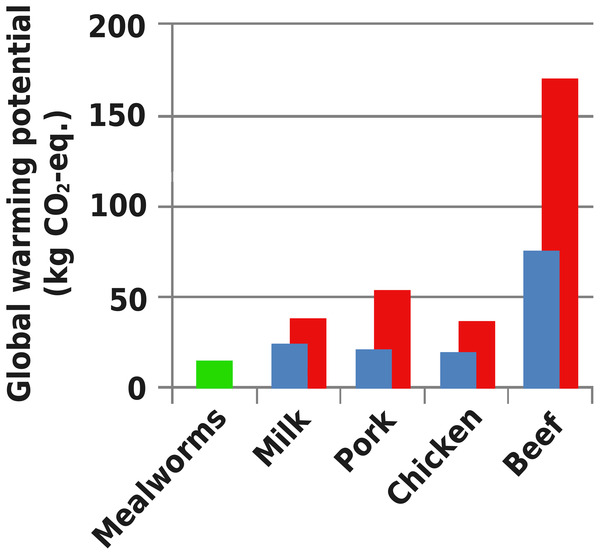When people talk about sustainable food in 2013, they really mean something with an 'organic' label that they can attribute all kinds of other ethical and environmental traits to - sustainable food the way those people mean it is not sustainable at all, there is no way organic food can feed anyone except the rich 1% (the economically rich and the food gentry lucky enough to be born into agriculturally rich lands) but if food enthusiasts mired in such first world guilt really want to try sustainable food there is a new solution published in PLoS One.
Mealworms. Survivalists already know that insects are an efficient meat alternative - Preppers worry that the freshness criteria of fast food means in an infrastructure collapse McDonald's would be out of hamburgers in three days, so this is fine for them, but the real marketplace is organic food shoppers who don't believe in hunting. Beetle larvae have more edible protein per ounce than the kind we grow on farms and none of the guilt because cute mealworms aren't in TV advertisements.
Imagine entire corporate farms devoted to it. That could feed the commoners and still leave plenty of emissions and nutrient run-offs for elites who can afford beef, without ruining the planet. But it will need early adapters so people who claim to care about sustainable food can 'walk the walk' right now.
The authors even have a chart, visuals make things easier. This part is an extrapolation similar the ridiculous 'it takes a gallon of gas to make a pound of beef' kind that I have debunked here and in "Science Left Behind". But if it gets activists to eat mealworms, that makes me giggle enough to use it here unchallenged.

Global warming potential due to the production of one kg of edible protein. Results from this study depicted in green. Minimum (blue) and maximum (red) literature data is adapted from de Vries&de Boer in Livestock Science (2010). doi:10.1371/journal.pone.0051145.g002
There is a downside that food enthusiasts may not like. The Wageningen University grad students behind this paper advocate actual science and not retreating into the past - genetic optimization of mealworms for food production has not really been done, and they factor that huge upside into their thinking. We all know that conventional farming in the US has led the world in dematerializing land and fertilizer so traditional farmers have a head start there and Big Frankenworm may have to be created in order for bug larvae to catch up..
They created their metric for environmental impact of mealworm farms versus traditional farms by factoring in land usage, energy needs and greenhouse gas emissions. As I mentioned above, some caution is in order on that last part. They have not accurately created an emission cost and are only guessing at an energy cost. Like the the fabricated nonsense from an activist in the 1980s ("Science Left Behind", pp. 59-63) that became the basis for all those 'it takes a gallon of gas to raise a pound of beef' claims we see even today, they have made an educated guess and picked the part of a wide range they liked, unless they have done something no other person or group on planet earth can do with any accuracy. Translation: They did not do it. But land use is easy enough to derive and even using a more realistic range for an 'emissions chain' than environmentalists use, mealworms come out looking quite good due to less energy input per kilogram of protein produced.
It isn't perfect. All meat production is going to be somewhat inefficient, of course, it always has been. If activists want to complain about really inefficient use of energy for meat production, they should try hunting for their own food some time, the way our ancestors they think we should emulate did. A desire for more meat and the energy inefficiency of hunting is why ancient man domesticated livestock rather than engaging in mitigation and rationing of wild game.
Mealworm farms required less land and similar amounts of energy, they determined. They claim mealworms will produce less greenhouse gases than other animals grown for meat. Good enough for me. Let's start a petition to get Whole Foods to put these in stores.
Citation: Citation: Oonincx DGAB, de Boer IJM (2012) Environmental Impact of the Production of Mealworms as a Protein Source for Humans – A Life Cycle Assessment. PLoS ONE 7(12): e51145. doi:10.1371/journal.pone.0051145




Comments